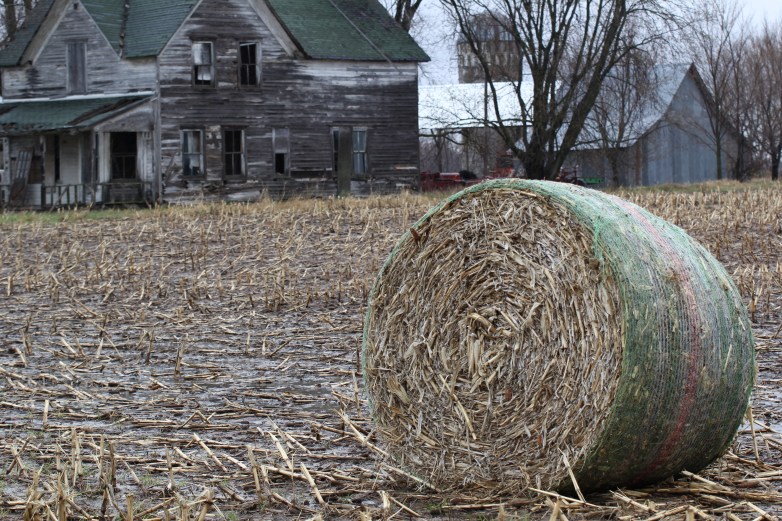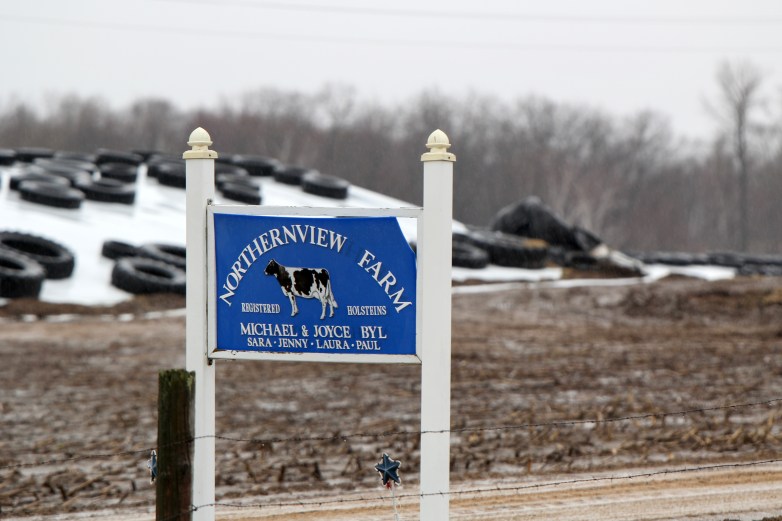
Source: Drake White-Bergey / Wisconsin Watch
Wisconsin towns brace for next fight on local control over large farms
A proposed pig CAFO spurred five northwest Wisconsin towns to regulate big farms. After one rescinded its ordinance, others wonder if they’ll face lawsuits.
Click to read highlights from this story.
- A proposed pig concentrated animal feeding operation (CAFO) spurred five northwest Wisconsin towns to regulate big farms — triggering heated debate. A lawsuit against one of those towns was dropped after it rescinded its ordinance.
- The Wisconsin Farm Bureau Federation and Wisconsin Dairy Alliance have since filed a far-reaching public records request for documents from an advisory group that shaped the municipalities’ CAFO rules. The four towns that still regulate large farms wonder if they will next face litigation.
After a developer began eyeing rural northwest Wisconsin for a large swine farm, five small towns enacted ordinances aimed at curbing environmental and health impacts.
Then, the state’s biggest business and agricultural interest groups fought back. They engaged disaffected residents. Some locals sued. Others ran for political office. New leaders in one Polk County town rescinded regulations on concentrated animal feeding operations, or CAFOs.
Now, officials in the remaining towns with livestock regulations wonder whether they, too, are in legal crosshairs.
The Wisconsin Farm Bureau Federation and Wisconsin Dairy Alliance have filed a far-reaching public records request for documents from an advisory group that shaped the municipalities’ CAFO rules.
In 2019, a developer proposed an operation, known as Cumberland LLC, that would have housed up to 26,350 pigs — the region’s first swine CAFO and what would be the largest in Wisconsin. Residents later formed the advisory group, believing that state livestock laws insufficiently protect health and quality of life.
In October, two farm families, represented by WMC Litigation Center, sued one municipality in the advisory group: Laketown, population 1,024. The town’s livestock, crop and specialty farms make up almost two-thirds of the landscape.

The plaintiffs, later joined by the Farm Bureau, argued that Laketown’s ordinance diminished property values and prospects for future expansion, a government overreach that could “essentially outlaw mid-to-large sized livestock farms.”
Scott Rosenow, the Litigation Center’s executive director, did not respond to multiple requests for an interview.
The records request follows the dismissal of that lawsuit, but some residents wonder if the lobbying organizations are “fishing” for another case, the latest effort to prevent local governments from regulating farming in America’s Dairyland.
Pig farm proposal roils northwest Wisconsin
Cumberland’s proposal sparked heated public meetings, dozens of letters to newspapers and the formation of a nonprofit opposition organization.
The CAFO would be constructed in Trade Lake, north of Laketown in neighboring Burnett County. Sows would be bred and piglets trucked elsewhere after weaning, where they would grow until slaughter.

The Wisconsin Department of Natural Resources rejected Cumberland’s application in March. The developer recently pitched a scaled-down project that would house 19,800 swine.
CAFO opponents in Laketown include back-to-the-landers, who view such farms as inhumane to animals. Others fear the health impacts of the millions of gallons of manure facilities generate annually, to be spread on farm fields.
About 90% of all nitrate groundwater pollution in Wisconsin comes from fertilizer and manure application, according to the DNR. The naturally occurring nutrient helps crops grow, but scientists associate exposure in drinking water with birth defects, thyroid disease and increased risk of developing certain cancers.
Other concerns are rooted in economics. Some Laketown farmers say CAFOs threaten smaller operations; others fear shrinking property values.
“It’s nothing more than big corporations getting together with the government and putting the screws to the little people,” said Vietnam Army veteran and recently ousted Laketown supervisor, Bruce Paulsen, who, like many opponents, speculates that the pork will be exported to China.
Laketown’s ordinance explained
The town ordinances regulate not where, but how CAFOs operate.
Laketown’s rules applied to new operations housing at least 700 “animal units,” the equivalent of 1,750 swine or 500 dairy cows, and required applicants to submit plans for preventing infectious diseases, air pollution and odor; managing waste and handling dead animals.
It also mandated traffic and property value impact studies, a surety for clean-ups and decommissioning and an annual $1-per-animal-unit permit fee — atop costs to review the application and enforce the terms of the permit.
The ordinance did not affect existing livestock facilities as long as the farms did not change owners, alter their animal species or expand beyond 1,000 animal units. But several residents believed the strict requirements amounted to a CAFO ban that would bar existing farms from growing.
Others protested government spending on the advisory group. Some said the smell of manure comes with living in a rural area.
Polk County Supervisor Brad Olson asked why farming gets blamed when excessive road salt and wastewater treatment plant overflows also taint water.

“I don’t think anybody denies that agriculture is part of the problem — or has the potential to be part of the problem in pollution,” said Olson, who farms crops and used to be a dairy farmer. “If we’re going to look at pollution, let’s look at the bigger picture.”
Clothing-optional campground owners Jen and Scott Matthiesen initially signed onto the lawsuit before attorneys requested they withdraw out of concern their business — “we’re not a nudist camp,” Jen said — would distract from the case. The couple worried that singling out farming could pave the way for special regulation of other businesses.
New Laketown Sup. Ron Peterson ran on the promise of overturning the ordinance. He believes it unlawfully superseded state laws. Those laws ban local authorities from regulating livestock more strictly than the state — unless they can prove a need to protect health or safety.
“The Wisconsin Legislature has been very clear in the statute that it’s their intent that they want uniformity in the regulation of animal agriculture,” said Peterson, a former attorney.
Gaps in DNR regulations
But supporters of Laketown’s ordinance say it merely corked regulatory leaks.
The DNR acknowledges it lacks legal authority to manage how livestock farming affects odor, noise, traffic and other issues unrelated to water quality. The agency also has struggled to keep pace with the proliferation of CAFOs, defined as farms holding at least 1,000 animal units.
The vast majority of Wisconsin’s 337 operations form the backbone of the state’s dairy industry. Just a dozen house swine.
As the DNR sees more proposals for large farms in recent years, staff shortages and turnover have fueled a backlog in permitting, delays in CAFO inspections and inconsistencies in violations enforcement, according to legislative reports.
As of June, the DNR’s permitting backlog totaled 20%, slightly less than this spring when administrators said they would need an additional 2.25 full-time-equivalent staff to handle the growing workload.
Sidestepping ‘right-to-farm’ protections
Wisconsin’s “right-to-farm” and livestock facility siting laws protect farmers from nuisance claims and generally rebuff local control over CAFOs.
Regulating livestock operations, but not banning them or restricting their locations, could enable communities to sidestep the laws — with major implications for the state’s $104.8 billion agricultural industry.
The strategy, successfully deployed in 2016 in Bayfield County, appears to be spreading. Facing the prospective expansion of a dairy CAFO in Pierce County, about 60 miles south of Laketown, residents are urging county supervisors to enact a CAFO moratorium until they can develop an ordinance.
“The problem is, we’re a disease for them,” said Trade Lake resident Rick Painter, a retired attorney who opposes Cumberland’s construction. “We’re a cancer, and they can’t afford for the cancer to metastasize.”
When confronted with legal threats, Laketown was among the few Wisconsin local governments to stand its ground, perhaps due to the deep expertise of its full- and part-time residents.

Trade Lake property owner and trial lawyer Andy Marshall and his brother David agreed to represent the town at no cost. If the other towns requested assistance, Andy Marshall said he would offer his services. Without money for a good legal defense, he said, small towns can get “steamrolled” by wealthy interest groups.
“It shouldn’t be the community that suffers because these companies can’t safely operate,” Marshall said.
Farmers want expansion options
Farmer Sara Byl views the anti-CAFO chorus with increasing skepticism.
Her family owns Northernview Farm, growing about 600 acres of corn and alfalfa to feed their herd of Holsteins in Laketown. Before Sara and her parents sued over Laketown’s ordinance, she served on the town’s livestock facility licensing committee, which studied whether it needed CAFO regulations.

Byl felt the effort evolved into a push against all large-scale farming rather than one hog CAFO.
“It was all about the hog farm — hog farm this, hog farm that,” she said. “Then they left off the word ‘hog’ and they just kept saying ‘farm.’ ”
The Byl family, three generations of farmers, doesn’t operate a CAFO, but Sara says the farm might grow if her son, nieces or nephews pursue agriculture careers.
Farmers expand for multiple reasons, said Michael Langemeier, a professor in the agricultural economics department at Purdue University.

Farm expansion and consolidation help lower production costs, increase efficiency and satisfy demands for safe, low-cost and uniform agricultural products. Larger farms also can financially support multiple owners and obtain favorable prices on supplies.
But CAFO opponents argue the consumer gains are offset by the federal policies that support large livestock farms, including taxpayer funded subsidies, and other costs resulting from their health and environmental impacts.
Bracing for next lawsuit
Although newly elected Laketown officials rescinded the rules in April, the CAFO regulations of four other towns remain intact.

That same month, the Dairy Alliance submitted public records requests to all towns in the advisory group for communications from current or former town supervisors about the group’s work. The Farm Bureau also requested records from all advisory group members related to its work, as well as its expenses.
Asked for comment, Cindy Leitner, the Dairy Alliance’s president, ceased correspondence with Wisconsin Watch after being provided with questions. H. Dale Peterson, general counsel to the Farm Bureau, did not respond to interview requests.
“I see it as a great opportunity to show the Farm Bureau all the great work we’ve done,” quipped Lisa Doerr, the advisory group’s chairperson.
Doerr, who grows forage on her 80-acre Laketown farm, contends the group was not a governmental body and lacked decision-making powers, so its members aren’t subject to Wisconsin’s public records law. She denied Peterson’s request.
“If they want to push me, then bring it on,” Doerr said.
Bone Lake town Chairman Andy Brown already fulfilled the records requests.
“I don’t have anything to hide,” he said. “If they want to see my emails back and forth about how to make this happen, then fine.”
With a defense team at the ready, Brown says he isn’t worried. “This is an important test case, and somebody’s gonna have to be in front of that firing squad some time or another,” he said. “And so if it’s us, it’s us.”
This article first appeared on Wisconsin Watch and is republished here under a Creative Commons license.![]()
Want More Local News?
Civic Media
Civic Media Inc.
The Civic Media App
Put us in your pocket.
